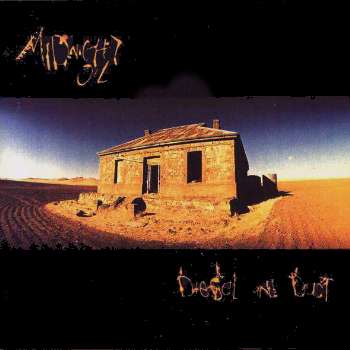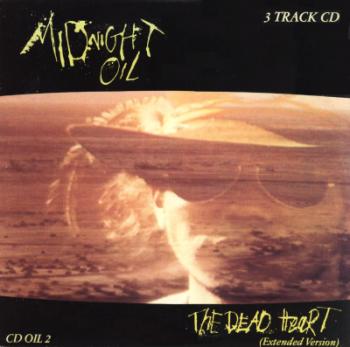Bomber
Bench
- Messages
- 4,103

One of Australia's best and most significant albums, voted the 13th Greatest Album of the 1980s by Rolling Stone USA, was released on August 1 1987. Yes I'm jumping the gun, but stuff it.
The original review in Rolling Stone USA:
http://www.rollingstone.com/artists/midnightoil/albums/album/203471/review/5945431/diesel_and_dust
This album is the last word in rock & roll road songs. No candy-ass laments about dingy hotel rooms, lousy room service and meaningless one-night stands. Diesel and Dust is soaked in real gas fumes and caked with real grit; it shakes and roars and throbs like the giant double-trailer trucks that chew up the thin asphalt ribbons and rough dirt tracks stretched across the Red Centre, Australia's desert heart.
The Oils know of what they sing, too. Diesel and Dust was inspired by the Sydney band's 1986 concert tour of aboriginal settlements in the Northern Territory, during which they played for audiences that, for the most part, didn't know Midnight Oil from "In the Midnight Hour." The group saw Mother Nature turning the white man's manifest destiny into rotting truck hulks and ghost towns frying in 110-degree heat, and they saw the aborigines' pride and spiritual defiance in the face of abject poverty and unforgivable cultural rape. In it all, the Oils found a choice metaphor for their beat manifesto. The issues and places in Diesel and Dust may be specific to Australia, but the larger meanings the impending collapse of one world, the fight for dignity in a new one are universal.
"Beds Are Burning" epitomizes the combined power of Midnight Oil's agitated lyrics and raging guitars. While alluding to the return in 1986 of Ayers Rock, a sacred tribal site, to aboriginal ownership ("It belongs to them/Let's give it back"), it also raises the specter of racial cruelty and an inevitable payback ("How can we dance when our earth is turning?/How do we sleep when our beds are burning?") with warlike synthesized horns, the inexorable ticking of Rob Hirst's monster drum clock and the strangled howl of singer Peter Garrett. Indeed, much of Diesel pivots on the contrast between artificial legal reality and the unwritten laws of honor. "White law could be wrong/Black law must be strong," Garrett snarls over and over against the cannonball chording of guitarists Martin Rotsey and Jim Moginie in "Warakurna." "This land must change, or land must burn!"
Diesel and Dust, on the surface, doesn't crackle quite like the Oils' earlier fireballs, 10, 9, 8, 7, 6, 5, 4, 3, 2, 1 and Red Sails in the Sunset. Kitchen-sink effects and whiplash breaks are kept to a minimum; the guitars pile up behind Garrett at a slower boil. But the Number One Australian single "The Dead Heart" its simple mix of propulsive drums and stacked acoustic guitars charged by Garrett's harangue and the sweet-and-sour blend of cello and horns shows just how well the band has turned standard pop-song formulas to its unique advantage. And there is definitely no mistaking the rebel heart in the climactic fight song "Sometimes."
It may seem like the ultimate in white liberal guilt for Midnight Oil, led by a lawyer and former Australian Senate candidate, to speak for the aborigines. Diesel and Dust, though, is really about conflicts and crises that transcend color lines. Anyone, anywhere, who has felt the sting of the lash, a heel on the back of the neck or the hate in another man's eyes will hear a piece of himself on Diesel and Dust. The rest of us can revel in it and learn from it. Or choke on it. (RS 523)
DAVID FRICKE

http://www.youtube.com/watch?v=td1ZLqrEpXI
The time has come, to say fair's fair
To pay the rent, to pay our share
The time has come, a fact's a fact
It belongs to them, let's give it back
How can we dance when the earth is turning?
How do we sleep when our beds are burning?

http://www.youtube.com/watch?v=Wdf9D_aA77s
And if the sea goes boiling black
Won't you tell me what you'll do about that?
Put down that weapon or we'll all be gone
You must be crazy if you think you're strong

http://www.youtube.com/watch?v=Dd_diPTrjpI
We carry in our hearts the true country
And that cannot be broken
We follow in the steps of our ancestry
And that cannot be stolen

http://www.youtube.com/watch?v=zaA079ZqjcY
So shut that buckle and turn that key again
Take me to a place they say the dreaming never ends
Open wide drive that mystery road
Walk through Eden's garden and then wonder as you go
Even though the Oils are long gone, and some certain members (*cough* Garrett *cough*) have appeared to sell out what they ardently believed in all those years ago, this album still kicks arse, and will forever stand as a testament to their time as one of Australia's premier bands.
Far off a dull radio beats for the young uninvolved
The meaning's a football
A stick and a can and a Kakadu man
Will the speaker speak up or the talker talk down
The world is no oyster and here in this town
sh*t falls like rain on a world that is brown
I come alive, I read the signs
On the Gunbarrel Highway
